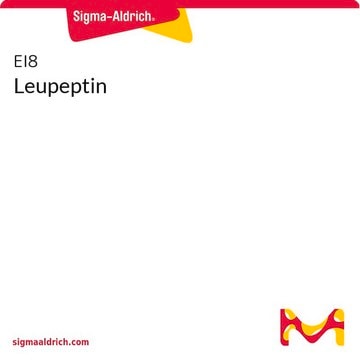205531
CA-074 Me
≥98% (HPLC), solid, Cathepsin B inhibitor, Calbiochem®
Sinónimos:
CA-074 Me, Cathepsin B Inhibitor IV, [L-3- trans-(Propylcarbamoyl)oxirane-2-carbonyl]-L-isoleucyl-L-proline Methyl Ester
About This Item
Productos recomendados
Nombre del producto
CA-074 Me, CA-074 Me, CAS 147859-80-1, is a cell-permeable analog of CA-074 that acts as an irreversible inhibitor of intracellular cathepsin B.
Quality Level
assay
≥98% (HPLC)
form
solid
manufacturer/tradename
Calbiochem®
storage condition
OK to freeze
color
white
solubility
DMSO: 10 mg/mL
shipped in
ambient
storage temp.
−20°C
General description
Biochem/physiol Actions
cathepsin B
Warning
Reconstitution
Other Notes
Authier, F., et al. 1999. J. Biol. Chem.274, 33723.
Hill, P.A., et al. 1994. J. Cell Biochem. 56, 118.
Buttle, D.J., et al. 1992. Arch. Biochem. Biophys. 299, 377.
Legal Information
Storage Class
11 - Combustible Solids
wgk_germany
WGK 3
flash_point_f
Not applicable
flash_point_c
Not applicable
Certificados de análisis (COA)
Busque Certificados de análisis (COA) introduciendo el número de lote del producto. Los números de lote se encuentran en la etiqueta del producto después de las palabras «Lot» o «Batch»
¿Ya tiene este producto?
Encuentre la documentación para los productos que ha comprado recientemente en la Biblioteca de documentos.
Nuestro equipo de científicos tiene experiencia en todas las áreas de investigación: Ciencias de la vida, Ciencia de los materiales, Síntesis química, Cromatografía, Analítica y muchas otras.
Póngase en contacto con el Servicio técnico








